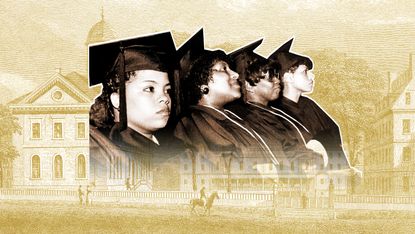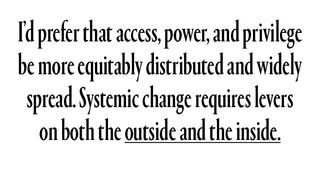
During my first year at Harvard, I was invited by a new friend to visit her in Manhattan before heading home for Christmas. I’m not sure how she traveled back to the city from Cambridge—I took the Fung Wah, a bus that went from Boston to New York for $10—but we eventually met up at her parents’ palatial apartment on the Upper West Side. I had never been in a New York apartment before, much less one with multiple floors. As I arrived, she was mid-argument with her mom. Apparently her sister had been given a chandelier in her bathroom during a recent remodel and she had not, causing great uproar.
I have recounted this story many times in the last 20 years, partly because it’s a guaranteed crowd pleaser that plays into people’s (often accurate) image of Harvard as a place full of the super rich. But thanks to affirmative action, in the fall of 2000, I was there, too. A Latina, daughter of a Cuban immigrant, product of the Miami-Dade County public school system.
As I’ve been reflecting on the Supreme Court’s decision to end race-based admissions at colleges (including at my alma mater, a defendant in the case), I have been thinking about my friend with the chandelier. She was very smart; she was also a legacy student, and matriculated from a private school that sends dozens of graduates to the Ivies every year. While a lot of people have questioned my admission to Harvard, I’m not sure anyone ever questioned her right to be there. I’ve also been thinking about what access to an education at Harvard really means. It’s not just about the big, bold H atop your résumé or the chance to be taught by a Nobel prize–winning astrophysicist (although it's those things, too). It’s about the people you meet and the doors that open. It's about proximity to power, and with that, the chance to change the system.
Even in my first year, I knew I was getting a first-class education; only it wasn’t from professors and textbooks. I quickly realized that who you knew mattered. I watched from the sidelines as kids of bankers and lawyers and senators got internships at banks and law firms and Congress. Once I stopped being mad about it, I started paying attention. I got my first two jobs at a consulting firm thanks to introductions from Harvard classmates, both of them were women, one a woman of color. That magic network created opportunities for me, and still does today.

My fellow classmates—the people I waited in line for parties with, the ones whose hair I held back in the bathroom after those parties finished—are now CEOs, governors, presidential candidates, hospital chiefs, Hollywood producers, and tech gurus. For better or worse, they are the people who are shaping the world. Diversity in the dining hall was a stepping stone to diversity in boardrooms and the White House and the Supreme Court. Think of what it means that CEOs and billionaires and doctors are not entirely homogenous. My closest friends from college were diverse ethnically, socioeconomically, geographically, and racially. And now, some of us are in charge; even me in my own small way. (I co-founded an award-winning impact intelligence agency that works with some of the world’s biggest foundations and companies on philanthropy and creating social change). Thanks to affirmative action, we were able to walk the same hallowed halls that were designed more than 400 years before for white, mostly slave-owning men.
I’m not condoning the system of structural inequality that gives elite colleges such an outsized sway over American life. Although I have benefited from it, I would rather live in a world where an Ivy League degree doesn’t automatically confer extreme privilege on its graduates. But until then, I’d prefer that access, power, and privilege be more equitably distributed and widely spread. Systemic change requires levers on both the outside and the inside.

Affirmative action is not a perfect program, but it’s one that enabled me—and others like me—to succeed and thrive in a world not designed for us. It’s how my kids—the great-grandchildren of a Cuban pig farmer—will be legacy applicants at Harvard, just like my friend with the chandelier, if they ever chose to apply. Affirmative action, for all its imperfections, created generational impact.
Stay In The Know
Marie Claire email subscribers get intel on fashion and beauty trends, hot-off-the-press celebrity news, and more. Sign up here.
This March, I was back in Harvard Square to promote my book. I sat in an overpriced coffee shop trying to remember what used to be there 20 years ago, and balking at the price of a latte while I waited for the Crimson reporter who was coming to interview me. When she arrived, I remarked about how cool it was that a current student was sitting with an alumni of almost 20 years and both of us were Latina. I asked her about her summer internship prospects—not much I could do to help, she was studying neurobiology—but I told her to reach out anyway if she ever needed anything.
That precious, tenuous, valuable connection that’s worth far more than the hefty cost of tuition—it’s what an entire generation just lost. And America is poorer for it.
-
 Anne Hathaway Says Online Vitriol from 'Hathahate' Cost Her Acting Roles
Anne Hathaway Says Online Vitriol from 'Hathahate' Cost Her Acting RolesMeanwhile, as so many are, she was struggling through loss that she didn't speak about as the trolls piled on.
By Meghan De Maria Published
-
 39 Items That Increased My Screen Time This Week
39 Items That Increased My Screen Time This WeekSpotted in my daydreams.
By Aniyah Morinia Published
-
 Katie Holmes Cracks the Commuter Outfit Code
Katie Holmes Cracks the Commuter Outfit CodeHer relatable wardrobe staples strike again.
By Lauren Tappan Published